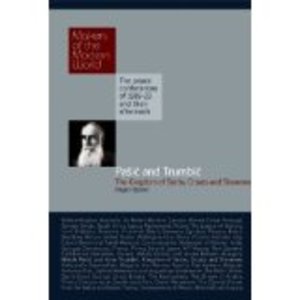Nikola Pašić and Ante Trumbić: The Kingdom of Serbs, Croats and Slovenes
Djokic, Dejan. 2010. Nikola Pašić and Ante Trumbić: The Kingdom of Serbs, Croats and Slovenes. London: Haus. ISBN 978-1-905791-78-1 [Book]
This is the latest version of this item.
![[img]](https://research.gold.ac.uk/3456/1.hassmallThumbnailVersion/nicolapasic.jpg)
|
Image
nicolapasic.jpg - Cover Image Download (4kB) | Preview |
Abstract or Description
The Kingdom of Serbs, Croats and Slovenes (Yugoslavia) faced many obstacles at the Paris Peace Conference of 1919-20, not least among them the different perspectives and conflicting strategies used by its two main delegates to the Conference: Nikola Pašić and Ante Trumbić.
Pašić, a wartime Prime Minister of Serbia, was the embodiment of pre-Yugoslav Serbia and as
such was chiefly concerned with territorial demands against Bulgaria, Hungary and Romania.
Trumbić, a Dalmatian Croat and a representative of pro-Yugoslav Croatia, wished to prevent Italy from gaining Dalmatia and Istria. Pašić’s sense for Realpolitik often clashed with Trumbić’s idealism – a conflict which resembled the one between traditional diplomacy and the Wilsonian principles among the Big Four.
Nevertheless, Pašić and Trumbić were brought together by the same ideal: unification and international recognition of Yugoslavia. The two men found themselves up against their allies, as well as their enemies. The 1915 Treaty of London, which promised the Dalmatian coast to Italy in return for joining the war on the side of the Allies, meant that Italy was Yugoslavia’s main rival at the Conference. A similar wartime arrangement placed Romania, another former ally, in the anti-Yugoslav camp. The young state was not recognized during the first few months of the Conference, but the presence of its delegation was tolerated. Prime Ministers Clemenceau and Lloyd George and President Wilson were overall sympathetic to the Yugoslav calls for self-determination, but had to deal with the Italian opposition. Another problem emerged when the Yugoslavs (like other East-Central European states), refused initially to sign the individual Paris Treaties which included the minorities clause. The Yugoslavs left the Conference having achieved most, though not all, of their goals.
Yugoslavia, often erroneously described as a ‘Versailles creation’, shared the tragic destiny of the post-Versailles order, destroyed by the Second World War. Nevertheless, it re-emerged as a communist-governed federation at the end of the War. Pašić and Trumbić’s achievements in Paris have had a longer-lasting legacy than it had seemed at times during the past ninety years.
|
Item Type: |
Book |
| Related URLs: |
|
| Departments, Centres and Research Units: |
|
| Date: |
2010 |
| Item ID: |
3456 |
| Date Deposited: |
19 Aug 2010 14:54 |
| Last Modified: |
08 Jul 2021 15:10 |
|
URI: |
Available Versions of this Item
- Nikola Pašić and Ante Trumbić: The Kingdom of Serbs, Croats and Slovenes. (deposited 19 Aug 2010 14:54) [Currently Displayed]
View statistics for this item...
 |
Edit Record (login required) |

 Tools
Tools Tools
Tools
